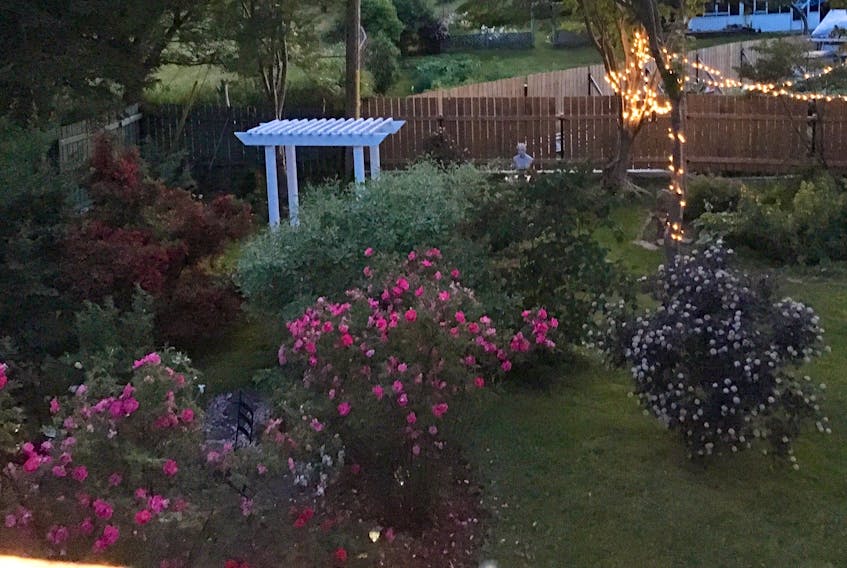On fine evenings we sit on the deck and soak up the view of the garden we’ve made.

The roses are in full blush and headily scented, the daylilies ready to burst into bloom. The weigela is ablaze with hundreds of blossoms like tiny scarlet trumpets.
The trees bristle with grackles and starlings flitting from branch to branch, while juncos search the ground for seed.
We’re talking about our plans for the garden, where the hostas should be moved, whether or not we can successfully transplant groundcover. How the stone circle we laid in the centre of the garden needs to be weeded. How the arbour where we were married is going to get a fresh coat of paint.
We’re talking about the garden.
We’re not talking about cancer.
But we think of cancer more now. It can be the subtext of conversations about the most ordinary of things. It’s a subject made more real since my husband was tattooed with targets marking the space where they’ll aim the radiation beams.
The word cancer comes from Old English, from Latin, by way of Greek, meaning “crab or creeping ulcer.”
It is an ugly word that creeps into our vocabularies like goutweed through the herb garden, pushing other, more pleasant things aside.
What we talk about when we talk about cancer is how it puts the brakes on your plans. The future, once seemingly sketched out by unwavering hands, has become unclear.
We talk about pain, burning, nausea, the potential for depression and fatigue. And these are just possible side-effects of treatment. Never mind the disease.
It is an ugly word that creeps into our vocabularies like goutweed through the herb garden, pushing other, more pleasant things aside.
What I hate about cancer — and there are many things — is how it must make people feel marked and vulnerable; like someone or something has given you the evil eye and you have no amulet.
How treacherous it can be.
How random it is; how stealthy.
How people talk about those for whom there was no cure having “lost their battle.” I know a person has a right to describe it in that way; perhaps it offers reassurance that everything that could be done was done. But it always seems to hint that if only somehow the person had fought harder, if somehow they could have compelled those abnormal cells to stop subdividing, they could have conquered it.
That to me, seems unfair. Lord knows, it’s not a fair fight.
It’s often bad luck of the draw — where it is, when it was discovered, the amount of research that’s been done, the particular treatment options that exist.
What do we talk about when we talk about cancer? Often the perils, the uncertainty. Too many people have been lost to it.
But it isn’t all dark clouds.
“Where there is treatment, there is hope,” my sister has said.
And she’s right. Hope makes fertile ground for seeds of optimism.
In the garden, there are many sources of inspiration.
The hollyhock, undeterred by the snails that have eaten holes in its foliage, reaches steadily upward, towards the sun.
The chives grow robust and sprout purple flowers, distinguishing themselves from the blades of grass attempting a hostile takeover.
In our clump of lupins, the wands of tapering pink flowers give way to the seeds that ensure their future.
A struggling single hosta that failed to thrive from one year to the next suddenly sprouts a twin.
The bearded iris that has failed to bloom appears one day in purple splendour.
A sudden downpour fills the bird baths, which lure bright goldfinches and northern flickers.
The oregano runs rampant on woody stems, crowding out intruder weeds, wafting herbal fragrance when you run your hands through it.
The sound of road traffic gradually ebbs as you settle into your chair to watch the sun go down. The fairy lights get turned on and twinkle in the dusk, and all you hear is the whisper of leaves and birdsong.
In these moments, we do not talk of cancer.
Pam Frampton is The Telegram’s managing editor. Email [email protected]. Twitter: pam_frampton
MORE FROM PAM FRAMPTON








